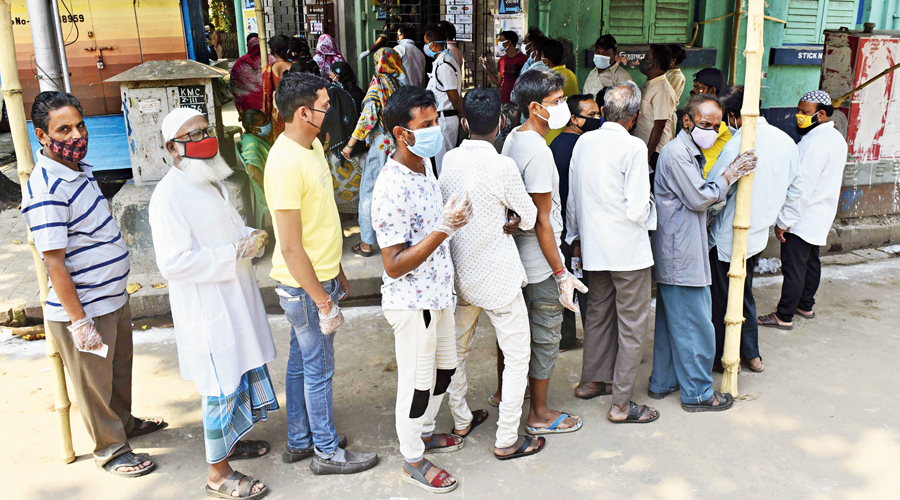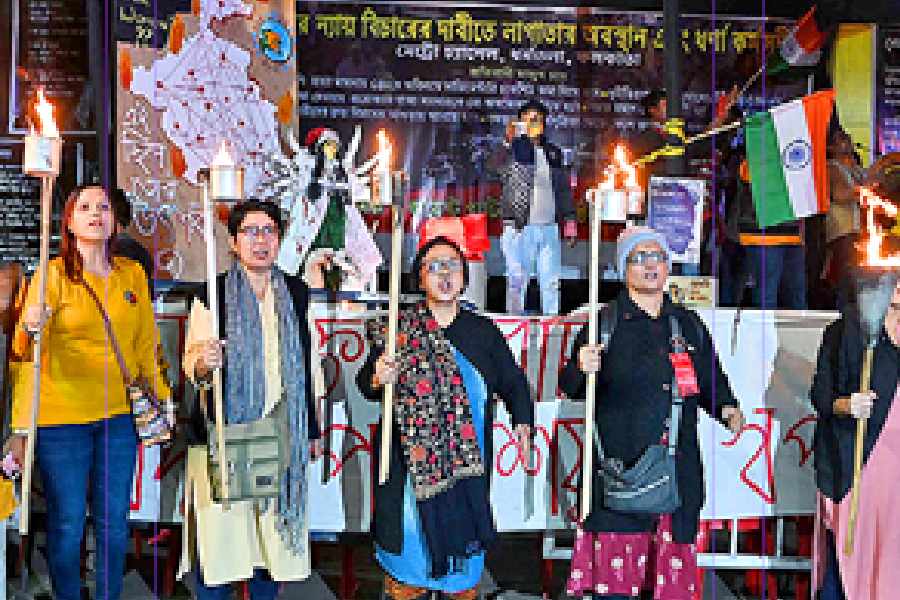One has never seen people in other states and cities of India so genuinely bothered about elections in Bengal. Many are actually petrified that nothing can hold back the BJP if the quintessentially secular bastion of Bengal capitulates.
Equally eager are several others to ensure that it does crumble, as it has held out far too long and delayed the patriotic homogenisation of a Hindu Rashtra.
Many also believe that India has already paid a heavy price because the only two who have monopolised decision-making in Delhi, by systematically disempowering ministers and bureaucrats, were too obsessively busy in Bengal to find time to tackle the coronavirus.
But in Bengal, people are more interested in ending this bitter chapter of the state’s political history. Indications are, however, that peace may take quite a long time to return to this state, irrespective of who takes over. The air is just too toxic to rule with any modicum of stability.
Although Bengalis have always loved heated arguments, they are not really conditioned to hate their opponent, or else they would be deprived of the next round. But now they look aghast as society is seared right through and even families and groups of friends are slashed into intolerant warring groups.
Poison has also penetrated through the sustained hate propaganda and the venomous debates of the leaders on both sides. It would take a serious and sustained effort to blunt the capacity of both parties to hit, harm and kill at will.
Nonetheless, the internationally known bookies of Rajasthan’s Phalodi and many online betting sites declared their winner long ago, and they are fretting as they wait for the annoying processes of voting to act themselves out.
Every few days, the home minister too hands out what would appear to the uninitiated to be the exact results of each phase of the polls. He is fed by multiple sources, especially after several institutions of state power have merged seamlessly with the ruling party.
The defending champions of Bengal too keep shrieking about their sure victory, confidently predicting that the millions spent on this “hostile acquisition” bid would go waste.
Unfortunately for the bookies and contenders, democracy has this incorrigible habit of upsetting many carefully arranged “realities”. One learnt this unforgettable lesson way back in 1977, as an assistant returning officer, when Indira Gandhi’s hordes had confidently declared that her victory was a mere formality.
Sadly, in the last couple of years, Bengal has slipped dangerously into the abyss it had avoided so adroitly from 1946 onwards, even after Muhammad Ali Jinnah had inflicted his bloody “Great Calcutta Killings”, quite well-planned.
Thereafter, the Muslim League and the Hindu Mahasabha went on an overdrive to create provocations and riots, even as H.S. Suhrawardy and Sarat Chandra Bose kept trying their best to retain Bengal as a united, separate nation.
In 1947, however, the communal divide won and Bengal was split in two. Even so, relations between the two communities were considerably different compared with the northern parts of India.
This was largely because of their passionate attachment to the common language, their similar food habits and other sensitivities — although “pride and prejudice” co-existed under the surface.
Thus, while Punjab and Delhi were overtaken by unprecedented manslaughter and devastation in 1947 when the nation was partitioned, Calcutta remained peaceful thanks to the superhuman efforts of Gandhi, who had successfully earlier doused the Noakhali riots.
In the succeeding decades, riots were sporadically ignited by fanatics in East Pakistan, under the indulgent eyes of communal elements in the government, mainly to grab property by driving out Hindus. Thus, waves of refugees streamed in every now and then, and sizeable numbers of Muslims also moved out of Bengal, insecure after the killings on this side.
Analysts, however, agree almost unanimously that Bengal handled the trauma of Partition far better than Punjab.
A factor that contributed was the ideological commitment of the communists who did not permit the communalisation of the refugees. They did, however, use them for other very disruptive political agitations and also to seize power.
Despite intermittent, bloody communal eruptions, the great fortitude of the early decades following Independence ensured that secular politics became the unquestioned “default mode” in Bengal.
The political formations that held power in Bengal since 1947 can be faulted on several issues, but none of them pla yed dirty communal politics or deliberately created riots. Muslims accounted for a substantial quarter of the population, or a bit more, and they were both vocal and visible.
How then did the situation undergo such a radical change towards the Hindu Right? The first reason was that communal poison finally succeeded in getting in, after years of a systematic injection of hatred against minorities. The BJP won over a section, largely from the high castes and upper classes and also from other, specifically targeted castes.
These converts suddenly discovered a Hindu identity that decades of Left and secular rule had never allowed to surface. Then, Mamata Banerjee’s pursuit of the Muslim vote and her own open publicity of photos in a hijab cut both ways.
The Hindu Brigade played upon these visuals, and those of beef hung for sale on open thoroughfares.
The marginal increase in the Muslim population was and is being constantly portrayed as the end of the Hindu civilisation. Besides, no one really noticed when the RSS systematically and quietly penetrated different parts of the state for decades, setting up schools and camps to influence people through social work.
Finally, many voters are now floored by the Prime Minister’s promise of a “Sonar Bangla”, a golden Bengal, if only the state gives up its 44 years of confrontation with the Centre.
It is undeniable that a large and committed section has swung decisively to the BJP and this cannot be wished away, even if all of its members are not hard-core Hindutva supporters. The party has enough strongmen and ample funding, as well as strong support from the central government that is forever restless to intervene.
The BJP surely reaped benefits from the Trinamul Congress’s adverse image of corruption and the intolerable behaviour of its musclemen and leaders. Its large-scale rigging of the 2018 panchayat elections surely alienated numerous people.
But its biggest blunder was to terrorise members of all the Opposition parties, who invariably moved to the BJP for protection.
Alternatives are ruled out, anyway, as the Left and the Congress have been marginalised at the polls, as the voting figures reveal. The Left now appears quite historically irrelevant and its excesses are still fresh in memory.
Its long rule and munificence has given rise to a reasonably well-off “new class” that revels in theoretical arguments and righteous indignation against “neo-fascism” but has hardly the strength to fight it.
The Congress has been drained of its life force by its former leader, Mamata, who is unshakable in her stand that she is the “real Congress”.
If Mamata manages to emerge paramount in this election, and her numbers are not bought over (which is not unlikely), she may play a more leading role in the nationwide surge against the BJP’s rock-solid rule.
Modi is absolutely unforgiving and no one knows how his wrath on Bengal will manifest. The war will only intensify and the BJP in Bengal is likely to step up violence, abetted by the central leadership, to harass the government.
But Mamata is also a desperate street-fighter and prone to belligerent agitations. As magistrate, one has had to “tackle” her and to actually “take her into custody” outside Jadavpur police station in 1983.
Over the following decades, she went on to win Bengal against an almost invincible regime, and now she considers the BJP prime game.
If she is, however, knocked off her perch, she will surely assume her familiar agitational self and ensure that Bengal’s new rulers do not get a moment’s peace. Police firings and the killing of dozens of her supporters have never stopped her.
After four decades in administration, one is quite apprehensive that trouble and chaos may thus rule, at least in the near future.
Jawhar Sircar is a former Union secretary and a public affairs commentator










